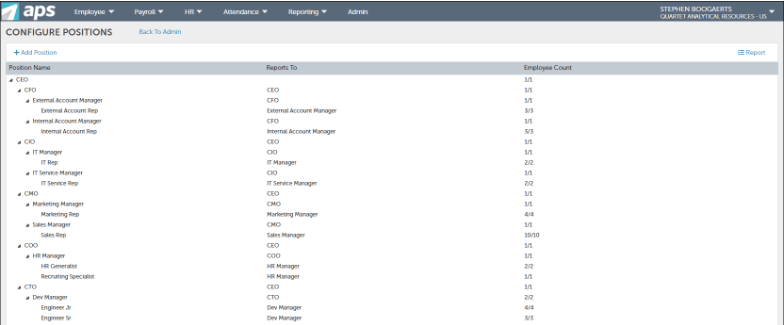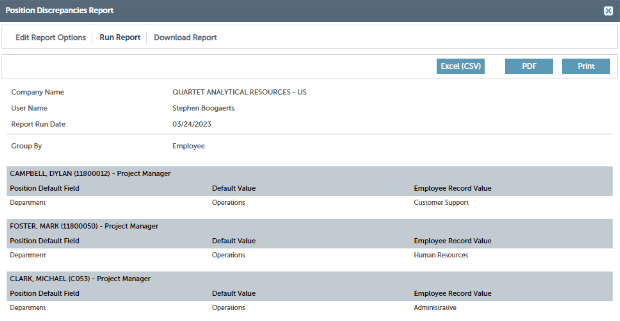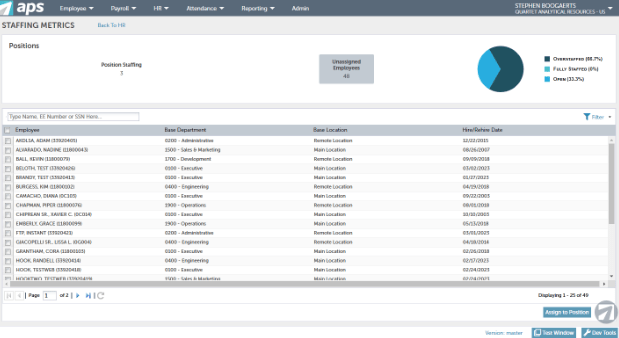Workforce planning is a crucial aspect of any successful organization. It involves analyzing the current workforce and identifying future talent needs to ensure that the right people with the right skills are in the right roles at the right time. Effective workforce planning can help organizations achieve their goals, improve productivity, and minimize the risk of workforce shortages or surpluses. By taking a strategic approach to workforce planning, organizations can ensure they have the talent they need to succeed in today’s rapidly changing business environment.
APS is pleased to announce the early access launch of its newest solution, Workforce Planning, with Position Management and Organizational Charting now available. By housing employee data in an all-in-one platform like APS, users can forecast, budget, and analyze their labor, making workforce planning processes more informed and data-driven. The goal of Workforce Planning is to streamline the administration of employee onboarding and progression with more insightful management of positions, forecasting, and compensation.
Why the Launch of Workforce Planning is Important
As a provider of mission-critical payroll and HR software and services, we aim to assist our customers in managing their workforce, which can be a challenging and costly aspect of running a business. Workforce Planning solves this problem, providing clarity and insights into staffing structure, metrics, and compensation for executives and managers.
HR departments can standardize position-specific components, making administration during onboarding and employee progression easier. Budgeting out headcount and compensation ranges allows our system to provide powerful analytics that help forecast, budget, and monitor performance and equality across employees in those positions.
“We are thrilled to bring our innovative Workforce Planning solution to our clients,” said Aaron Johnson, President of APS. “This has been a two-year journey to provide a solution that solves the shortcomings of traditional bundled Talent Management offerings. During this process, we met with our Product Advisory Group, consisting of customers from different industries and company sizes, to gather and incorporate their feedback. The result is an all-encompassing solution that understands staffing structure, organizational hierarchy, compensation equality, and people analytics.”
Now Available in Workforce Planning
The following features and functionality are now available in Early Access for Workforce Planning:
Position Management
Position Management is the process of establishing position attributes, headcount, and budgeting for an organization. It is the foundation of Workforce Planning, ensuring data consistency for new hires and transfers and simplifying overall personnel management. Within Position Management, users can:
- Assign attributes by position during the new hire process and transfers
- Access exception reporting on position attributes by employee
- View headcount per position
- Establish a reporting hierarchy by position
- Identify staffing vacancies and overages

Configuring Positions in APS
Position Management empowers users to forecast, budget, and analyze their labor, allowing Workforce Planning to be informed and data-driven.
Workforce Planning Reporting
When a position is created, modified, or deleted, there are several reports that are available to access:
- Position Discrepancies: Displays employee position discrepancies between the assigned employee position and the position defaults. Employees listed in this report have a different value for a field listed on their record vs. the default value listed in the position configuration.
- Position Headcount: Displays position headcounts that can be grouped by department, location, and position.
- Positions: Displays a list of employees with information about their positions and position tiers.

Position Discrepancies Report in APS
Staff Metrics
Once positions are configured and assigned, users will have access to the Staffing Metrics dashboard with insights that include:
- Overstaffed Positions: Positions that have more employees than needed
- Understaffed Positions: Positions that have fewer employees than needed
- Fully Staffed: Positions that have enough employees
- Open Positions: Positions that are available to fill
- Unassigned Employees: Employees that need positions assigned
With this visibility, users can make more informed decisions about what positions to fill first and create a budget around those staffing needs.

Staffing Metrics Dashboard in APS
Organizational Chart
The Organizational Chart, or Org Chart for short, uses the hierarchy set within Position Management to create an organizational structure of the company. Because the Org Chart depicts the user’s organization hierarchy with clearly identified seniority and lines of authority, ambiguity is removed, thus improving communication.

Org Chart in APS
Businesses often manage their organizational charts in disparate systems or spreadsheets, creating a lack of visibility for executives, managers, and employees across departments. However, our Org Chart is built into Workforce Planning, eliminating the need to update it separately in APS, as any changes to Position Management automatically reflect in the Org Chart.
The Future of Workforce Planning
Future releases of Workforce Planning will include:
Compensation Budgeting
Managing wages is a significant business expense, and efficiently managing headcount and compensation is crucial. Most companies use spreadsheets for expense and variance reporting. Compensation Budgeting in Workforce Planning will identify variances between actual and expected wage expenses using projected headcount and salary ranges from Position management. Furthermore, users can view variances at the employee level.
People Analytics
People Analytics will provide employee performance-related metrics. Companies can view metrics such as turnover by manager, department, and location. Performance comparisons can also be used to identify discrepancies for a more proactive approach.
Pay Equality
With Pay Equality, companies will gain valuable insights into pay equality within positions related to tenure, gender, and performance, as well as external market compensation benchmarks so that businesses can stay competitive.
How Organizations Benefit from Workforce Planning
For mid-market companies that need the ability to manage positions, forecast hiring, and budget strategically, Workforce Planning allows users to streamline administration during onboarding and employee progression.
Businesses can efficiently address budget issues, headcount gaps, and employee inequality because of the access to employee data and analytical dashboards in one system. Human resources teams can execute more effective workforce planning strategies that align with organizational goals.
If you’re a current APS client, phase one of Workforce Planning is available in your Early Access admin settings. You can visit the APS Help Center for more information about Position Management and the Org Chart.
If you’re interested in learning more about Workforce Planning, reach out to your support team or contact us.



